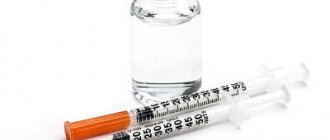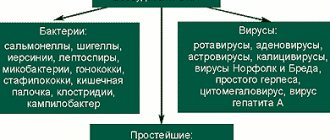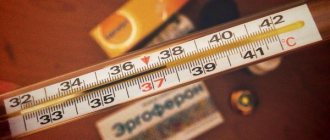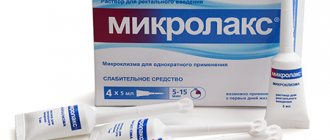Prevention and treatment of acute intestinal infections
During bathing, we willy-nilly (and small children even on purpose) swallow water along with living organisms. In the vast majority of cases, such an invasion goes unnoticed, since our body has several degrees of protection, more powerful than that of a bank note. But sometimes the defense system fails, which provokes an acute intestinal infection.
When mentioning the dangers lurking in bodies of water, one cannot ignore the topic of the inhabitants of these bodies of water. We will talk about the most dangerous creatures inhabiting our rivers - piranhas. Oh, no, it’s a joke - piranhas are a little further south.
In fact, my story, of course, is about bacteria, about the prevention and treatment of intestinal infections. Sometimes you are surprised when we, so big and strong, who have inhabited all corners of the planet and even a piece of space, die from microscopic creatures. I remember the film “War of the Worlds” by Wells, where even the healthiest aliens gave in to germs.
However, I can’t vouch for aliens, but people have something to counteract harmful microorganisms. Our saliva contains a substance (lysozyme) that complicates the life of bacteria even when it enters the mouth. The lymphatic ring in the oral cavity, being a peripheral organ of the immune system, also reliably protects against the penetration of aggressive creatures. And gastric juice is aggressive to almost any flora. But under certain conditions (immature immune system in children, immunodeficiency, elderly people, alcoholics) bacteria take over, causing acute intestinal infections.
Where does the infection come from?
Life is seething in reservoirs, invisible to our eyes, and this life will gladly take advantage of the bodies of careless bathers. Intestinal infection is the most common problem of the summer season. Strictly speaking, acute intestinal infection occurs not only from swimming. This is a problem of unwashed hands, vegetables, fruits, and poorly processed food. The cause of intestinal infection is pathogenic bacteria (occasionally viruses and fungi).
By the way, in our digestive tract there are also beneficial bacteria (bifidobacteria, lactobacilli, etc.), in other words, obligate flora. They participate in digestion, the production of enzymes, vitamins, and compete with pathogenic flora, suppressing its development.
Conditionally pathogenic microorganisms (streptococci, Proteus, E. coli, etc.) also live inside the body, and if the immune status is preserved, they are harmless to us. But they can cause disease if the immune system is weakened.
But bacteria that enter from the outside are pathogenic flora. The diseases they cause are yersiniosis, salmonellosis, typhoid fever, cholera, etc. - can pose a serious threat to life.
How does the disease manifest itself?
At first, microbial invasion manifests itself... but does not show anything. The incubation period lasts about two days, the time that the victim has to solve the last matters while the harmful microbes multiply and accumulate poisons. Then there is intoxication, fever, aching joints - for a day an incomprehensible condition that can be confused with the flu or something else.
This is followed by the flourishing of intestinal infection. These are, as a rule, spasmodic pain in different parts of the abdomen, repeated vomiting and, of course, repeated loose stools. Sometimes the liquid pours out of a pipe - like with cholera. Sometimes with an admixture of blood - as with dysentery. The degree of dehydration reaches extreme values, threatening the patient's life.
Dehydration is especially severe in young children. Very often such babies are brought to our department. The eyes are sunken, the cry is weak, the skin is as dry as a shoe. There is no time for jokes, life hangs by a thread.
Factors determining the severity of the condition:
- type of bacteria
(from staphylococcus only six times diarrhea, and from vibrio cholerae it will flow like from a fire hose until complete dehydration); - the number of bacteria
that have entered the body (a hundred or two will do nothing, but a colony of several thousand individuals will certainly cause suffering); - state of health
before an infectious lesion (a healthy person will run to the toilet and only become healthier, but the heart will have a worse time).
You need to stop self-medicating and herbal eating and immediately consult a doctor if: - The above symptoms are observed in preschool children, elderly people over 60 years of age and in people with chronic diseases of the cardiovascular and respiratory systems. — Frequent, loose stools more than 5 times in adults. — There is an admixture of blood in the stool and vomit. - High fever with diarrhea and vomiting. - Cramping pain in the abdomen of any location, lasting more than an hour. - Vomiting after any meal or water. - Marked weakness and thirst.
What to do at home?
- First of all, you need to replenish dehydration.
Drinking is what you need!
If you cannot replenish dehydration with this method (vomiting or retching occurs), call an ambulance. How much should you drink? Until the thirst subsides. It's simple - drink while you want. The risk of overloading yourself with liquid is minimal. If you have concomitant pathology of the kidneys or heart, call an ambulance! Drink clean, bottled water. You can replenish the fluid with a solution of rehydron
- although it is terribly disgusting, but useful in microelements. - Enterosorbents.
Activated carbon, enterodesis and all sorts of similar tasteless, but useful and safe drugs. - If it is impossible to call a doctor, and vomiting worsens dehydration, find Cerucal (metoclopromide)
. - Medicines for intestinal disorders will be needed, if the disease does not recede, antibacterial drugs will be needed: the bacteria must be killed. The choice of drugs depends on the possible pathogen, the severity of the condition, the urgency of the situation, and the patient’s allergies. Therefore, “self-prescribing” medications is not a good idea. But if you do not have the opportunity to see a doctor, in a difficult situation (hiking, tourist trip) the best option is furazolidone
. This is something you can keep in your first aid kit. Take 0.1–0.15 g after meals, 4 times a day for adults. For children - 10 mg/kg body weight per day (daily dose is divided into 3-4 doses). Take no more than 10 days. - About food. In the acute period, it is better not to eat, but to drink, drink, drink. When it becomes a little easier, you can have low-fat broths and crackers. But the acute period must be endured.
- If you have abdominal pain, it is better not to take painkillers - do not erase the picture of the disease, in case you have appendicitis!
- If you have diarrhea, you should not take astringents such as imodium or loperamide - the body must get rid of toxins and bacteria.
And in conclusion, although this is trivial, I repeat: wash your hands before eating, wash vegetables and fruits, prepare food from quality ingredients. It's so simple, but incredibly effective. Be healthy!!!
Vladimir Shpinev
Photo thinkstockphotos.com
Products by topic: [product](rehydron), [product](activated carbon), [product](enterodesis), [product](cerucal), [product](furazolidone), [product](imodium), [product] (loperamide)
How does an intestinal infection occur?
Viruses, bacteria and protozoa that cause intestinal infections live in the stool, saliva, urine and vomit of patients. Then they can get into water, food, and various objects, and thus infect other people. Therefore, measures to prevent intestinal infections are to wash your hands, as well as fruits, vegetables and berries, maintain hygiene after using the toilet, do not drink from the same bottle with others, use only your own spoon and fork.
Do not consume unboiled milk; thoroughly boil or fry meat. An intestinal infection can be contracted by swimming in dirty water and in many other ways. Some intestinal infections, especially viral ones, are transmitted through household contact.
How to feed a child with an intestinal infection?
If you are being treated at home and your child is vomiting and has diarrhea, the most important thing is to give your child the right amount of water. Often, if a sick child drinks several sips at once, this can trigger vomiting and he will lose even more fluid. Therefore , it is recommended to feed the child every 5-10 minutes, giving him 5-15 ml of liquid at a time. You should not give your child only clean water, as this can lead to a salt imbalance.
You can give your child a pharmaceutical rehydrate solution (for example, Regidron) or prepare such a solution yourself. However, if the child does not drink at all, the choice should be made in favor of any liquid that he agrees to swallow.
How can you tell if dehydration is developing?
Intestinal infections lead to the body losing water and salts (sodium, potassium, chlorine, etc.) due to vomiting and diarrhea. Dehydration is one of the main dangers of an intestinal infection, as it can very quickly lead to death, especially in young children. A parent should be wary if he sees the following signs:
- dry mucous membranes of the mouth and tongue;
- grayish skin;
- saliva viscosity increased;
- the child is lethargic, sleepy;
- the baby’s fontanelle on the head sinks, the pulse quickens;
- the baby peed twice or less in 12 hours, the amount of urine is small, it may be dark, with a strong odor;
- intense vomiting, the child cannot be given anything to drink. In this case, you should go to the hospital, where the child will be given a drip and the fluid balance in the body will be restored.
How to treat and not pass on an intestinal infection to others?
Treatment depends on the pathogen and severity of the disease. For example, dysentery or norovirus can be treated at home. But only a specialist can help with salmonellosis. In any case, to make a decision on treatment, you must call a doctor and undergo laboratory tests.
Here's what you can do to get started:
- Restore water-salt balance. It is better to drink boiled or bottled water with the addition of special solutions for rehydration
- Take enterosorbents to relieve intoxication of the body, as well as painkillers and antipyretics
- Eliminate fried, salty, spicy, raw foods from your diet
- If you want to eat, it is better to give preference to simple food: soup, rice, bread
- Rest more
How to avoid infecting others if you or your loved ones are sick?
- Wash your hands thoroughly
- Regularly disinfect common areas and the patient's room: especially the toilet, bathroom, kitchen
- Provide separate dishes and towels for the sick person
- Change bedding and clothing regularly and wash them at high temperature (60°C)
- Limit your social circle, isolate the sick person
It is recommended to visit public places no earlier than two days after the symptoms have completely disappeared, and places such as a swimming pool are better after two weeks.
Sources of infection with rotavirus infection
The source of infection is a sick person, and even ten days after recovery, the virus continues to appear in feces. This is why it is so important to maintain household hygiene.
Infection occurs in the following ways:
- Through food or water
- Using the patient’s household items: dishes, towels, toys
- Upon contact with a sick person
The virus can be picked up in transport or in a store, which is why it is so important to wash your hands after going outside.
Rotavirus is highly resistant. Once in the human body, the pathogen infects the epithelial cells of the small intestine. Instead of affected cells, they are replaced by immature epithelial cells, which are functionally defective, which leads to enzymatic insufficiency of the intestine. In conditions of lack of enzymes, the gastrointestinal tract is not able to break down carbohydrates and especially lactose. Therefore, the patient is prescribed a special diet without dairy products and baked goods. Thus, undigested food remains enter the large intestine, fluid from surrounding tissues accumulates in it, and the patient suffers from diarrhea. As a result, dehydration occurs.
The disease does not go away until the epithelium becomes mature and the intestines are restored.
Diagnosis of intestinal infection in children
Based on an examination, epidemiological and clinical data, a pediatrician (pediatric infectious disease specialist) can only assume the likelihood of an intestinal infection in children, however, an etiological deciphering is possible only on the basis of laboratory data.
The main role in confirming the diagnosis of intestinal infection in children is played by bacteriological examination of stool, which should be carried out as early as possible, before the start of etiotropic therapy. In case of a generalized form of intestinal infection in children, blood cultures are performed for sterility, bacteriological examination of urine and cerebrospinal fluid.
Serological methods (RPGA, ELISA, RSK), which make it possible to detect the presence of antibodies to the pathogen in the patient’s blood from the 5th day from the onset of the disease, are of certain diagnostic value. The study of the coprogram allows us to clarify the localization of the process in the gastrointestinal tract.
In case of intestinal infection in children, it is necessary to exclude acute appendicitis, pancreatitis, lactase deficiency, biliary dyskinesia and other pathologies. For this purpose, consultations are held with a pediatric surgeon and a pediatric gastroenterologist.
Symptoms
The main signs of the disease, regardless of the type of infection, are constant diarrhea. It is significantly different from the usual disorder. The stool is copious, liquid, and may contain blood and mucus. The urge is very frequent and does not bring relief.
Other symptoms may include:
- muscle weakness;
- increased body temperature;
- cutting pain in the abdomen;
- lack of appetite;
- nausea;
- rumbling in the stomach.
In half of the cases, frequent vomiting, problems with urination, and dehydration are also observed. If the disease is mild, then these symptoms may not be observed, but in an aggravated situation, the symptoms may become more pronounced.
Treatment options
As soon as the first symptoms of the disease appear, you should eat as little food as possible and drink plenty of fluids to prevent dehydration. It is better to drink regular non-carbonated mineral water, compotes, and unsweetened tea. The liquid should not be cold or very hot.
Rehydration products
Helps with frequent vomiting and diarrhea. It is worth giving preference to pharmaceutical drugs.
Enterofuril has proven itself well, capable of fighting any intestinal infections.
Antibiotics
Prescribed to treat many bacterial infections. They can only be used for medical purposes. This or that drug is able to fight a specific type of bacteria. It is important to correctly identify the causative agent of infection. Proper use of antibiotics will allow you to experience a noticeable improvement within a day after starting treatment. They should be taken throughout the entire treatment course, the duration of which is determined by the doctor.
If treatment is interrupted, the remaining microorganisms will become resistant to antibiotics and become insensitive to their action. As a result, over time the disease will manifest itself with even greater force and it will be more difficult to overcome it. Effective agents include: Levomycetin, Ampicillin, Rifaximin.
Antiprotozoal agents
Effective against protozoal infectious lesions. Like antibiotics, they can only be prescribed by a doctor; you should never self-medicate, otherwise there is a risk of worsening the condition. First you need to do an examination. The results of the analysis will allow you to establish an accurate diagnosis and select appropriate medications. Usually prescribed: Ornidazole, Clarithromycin, Spiramycin.
Description of the disease
Intestinal infection refers to diseases of the gastrointestinal tract caused by bacterial, viral or fungal agents.
The most common pathogens are: enteroviruses, rotaviruses, salmonella, staphylococcus, dysentery bacillus, etc. Intestinal tract infections are widespread in childhood. In terms of incidence, they are second only to respiratory diseases. Infection, as a rule, occurs due to non-compliance by the child and his parents with the rules of personal hygiene, sharing toys and other household items with infected people, and eating unwashed vegetables and fruits. The disease can be identified by impaired bowel movements, nausea, vomiting, a sharp decrease in appetite and an increase in body temperature.
If you suspect that a child has an intestinal infection, you should immediately seek advice from a gastroenterologist. Lack of treatment can provoke the development of serious complications: septic condition, shock due to vascular paralysis due to bacterial intoxication, acute kidney failure, heart failure, etc.





